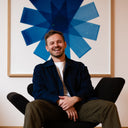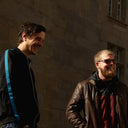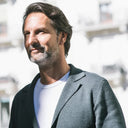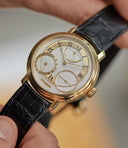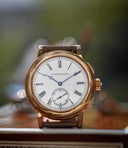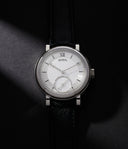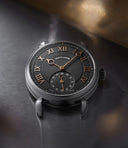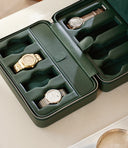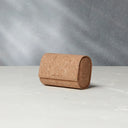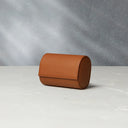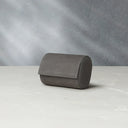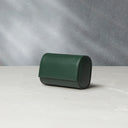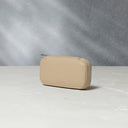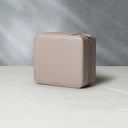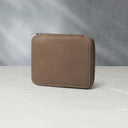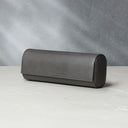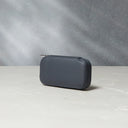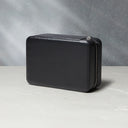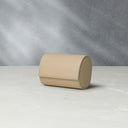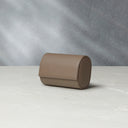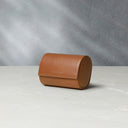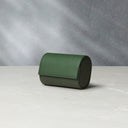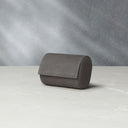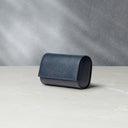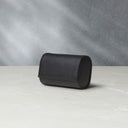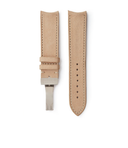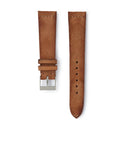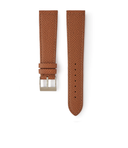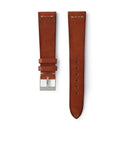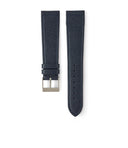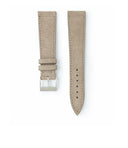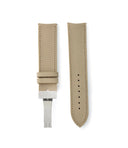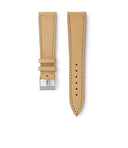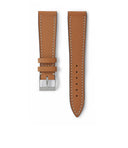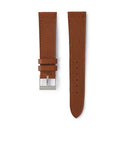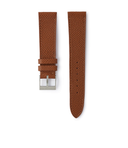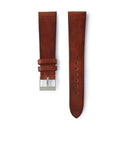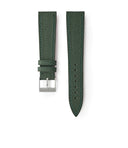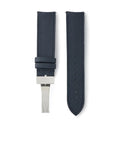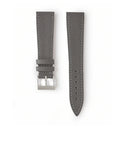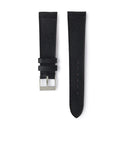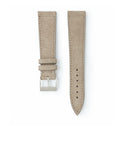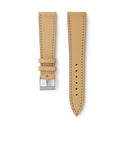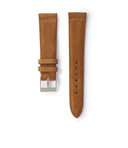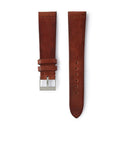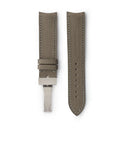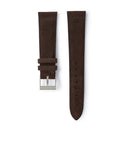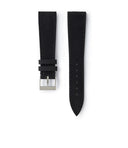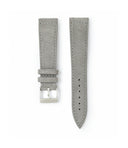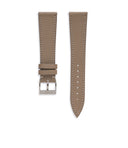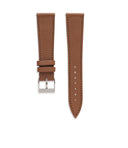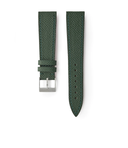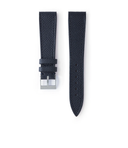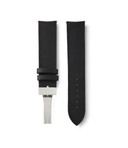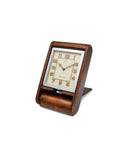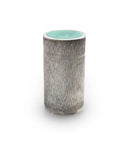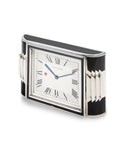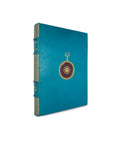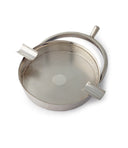My Watch: Edward Sahakian
The deeply-rooted connection between watches and cigars is no great secret; with many watch collectors meeting up regularly to enjoy a smoke and a whisky, while discussing the topics of the day and, of course, what’s on each-other’s wrists. For the latest instalment of My Watch, we sat down for a smoke with father and son, Edward and Eddie Sahakian of Davidoff Cigars, at their sampling lounge in the Bvlgari Hotel in Knightsbridge, London.
Tell us a little about your experience of growing up in Iran?
I was born and raised in Iran and lived there until the age of 34, leaving towards the end of 1978. As a matter of fact, it was the 28th of December 1978 when I left the country and have been unable to go back since. The reason I couldn’t go back is quite a long story, so I will keep it brief, or we will be sitting here until tomorrow morning [laughs]...
[Laughs] Understood…
So, our family business was in soft drinks and beer, bottling popular brands like Coca-Cola, 7UP and Canada Dry, but we also had three factories producing local and imported beer. We were equally the sole importers of Tuborg beer as well as producing it under license. The annual consumption of beer in Iran at the time was 100 million bottles a year, with a population of 32 or 33 million.
Wow…
Yeah… [laughs]. As the revolution was occurring, which was all very organised by an extremist, they attacked three of our factories, burning them to the ground. Like they did to cinemas, nightclubs, and other factories that were manufacturing alcoholic drinks; they did it to us too, just to set an example.
"They told me about the Dunhill shop, where they would actually mix the tobacco and blend it to your tastes, making a note of your blend so that you could order it regularly. My thinking was that if they can mix it there, I can mix it here."
That sounds awful…
Definitely, and while this was all happening, we were in London celebrating Christmas and New Years Eve. We got that dreaded phone call on the 6th of January saying, “Don’t even think about coming back, because this is what happened yesterday.”
What was your immediate reaction to the news?
Well, I was coming to terms with the fact that the situation was very bad and that it wasn’t going to get better any time soon. I had a horrible feeling that I would be unable to return home for a very long time.

What an awful thing to experience. Before we get into what you did after that, can you tell us a bit about your early experience with Cigars?
So, I started smoking when I was 16, and that was with a pipe. I bought my first pipe using pocket-money that my father had given me, but obviously didn’t tell him what I had spent it on [laughs].
[laughs] Clearly he wouldn’t have been impressed…
[chuckles] No! Then, I started buying whatever tobacco I could get my hands on, and began blending it, enhancing it and mixing it with some local tobacco. My love for smoking a pipe continued for a long time, but I never smoked a cigarette!
What was the reason you began blending and experimenting with the tobacco?
That was mainly down to the limitations of the tobacco that was available to me. There were two types of tobacco, one called Amphora Red and the other was Half and Half. The Amphora was a bit more aromatic, it was nice tobacco, but the Half and Half, I wasn’t so keen on. Somebody had mentioned to me that in England they blend tobaccos. They told me about the Dunhill shop, where they would actually mix the tobacco and blend it to your tastes, making a note of your blend so that you could order it regularly. My thinking was that if they can mix it there, I can mix it here.
How did it come out in the early experiments?
Well, the tobacco wasn’t treated in any sense, so I used to get the raw pipe tobacco and I would then add flavours to it, things like rum or brandy.
At the age of 16?
[Laughs] Yes, at the age of 16. I would also put slices of apple or apricots on top of it to give it a hint of flavouring; I did all sorts of experiments.
Did you father ever find out that you were not only smoking, but also presumably, using his rum and brandy to flavour your tobacco?
[Laughs] No, but at some point later, I think he realised that I was a smoker, because by the age of 20 or 21, he would see my pipe in my office. He would pretend not to see it and even I pretended that it wasn’t mine. The room definitely smelt of tobacco though…
"Suddenly, I discovered the box of cigars, and out of sheer desperation I said, “Let me try this cigar, it’s still tobacco, it can’t be all that bad.”
How did you then move onto cigars?
At around the age of 23 or 24, a friend of mine returned from Lebanon and said that he had brought me back a box of cigars. He had seen me smoking my pipe and thought it was all the same, and I told him, “I smoke pipes, not cigars.” He insisted that I try them as they were very nice, so out of courtesy, at ten o’clock in the morning I took a cigar out of the box, cut it, lit it and smoked it.
How was it?
It was terrible.
[Laughs] How so?
It was a Partagas, so it was a very strong cigar. I put it down and said thank you very much. that was the end of that. Then, a few months later, I was in my office with my pipe and I realised that I had no tobacco. I was searching every drawer, every pocket and came up with nothing. Suddenly, I discovered the box of cigars, and out of sheer desperation I said, “Let me try this cigar, it’s still tobacco, it can’t be all that bad.”

Did you have the same reaction as the first attempt?
Well, I started smoking it and to my surprise, it tasted good. What I realised was that after I had eaten a good meal, lighting up a cigar tasted very good. The friend of mine that had bought them for me, coincidentally came back to me a few months later and asked if I had tried the cigars. I said, “It’s funny you should mention that because the first time it made me sick, but then I tried one after lunch and it was very pleasant.” He told me that they are very strong cigars, and that you should never smoke something like that on an empty stomach. This was the first time I had heard of a cigar being a ‘strong’ cigar. This was my first lesson about smoking strong cigars.
How did the interest develop from there?
Around a year or so later, I was travelling to Geneva on business with another friend and he asked if I could pick up a box of cigars for him while I was there. He told me about a shop there called 'Davidoff' and that they had very nice cigars. I said, “Yes, no problem, I’ll grab you a box.” I walked into the Davidoff store before flying home and Mr. Davidoff himself was there at the counter.
"A few days later, we went for lunch at Wiltons which was in Bury Street, a very nice lunch, followed by a smoke. The golden days, as I call them, because you could eat, drink and smoke at the same time [laughs]."
Wow…
He said, “Can I help you?” I said, “Yes, a friend of mine wants these cigars.” He goes about grabbing the various sticks my friend had requested, and then asked me what I would like for myself. I told him that sometimes I found them a little too strong, so he directed me to a milder smoke which was a box of the "Davidoff No. 2s". This was the very first Davidoff that I smoked, and I lit one there and then in the store.
How was it?
It tasted very good, so I bought the box and from that moment on, I began smoking more and more cigars, rather than pipes. I began buying more and more whenever I was on trips out there, and started buying from the Dunhill store in London too. I would occasionally fall in love with the design of a pipe they had in there, but more like a watch; you buy it to keep it, rather than smoke it [laughs].
So from being unable to return to your home country following the revolution, how did you then set-up a business in London?
The first thing I did was seek-advice from a solicitor, as far as residency goes, because I was there on a tourist visa. I wanted to make sure that I didn’t do anything wrong, and I wanted to make sure I would be able to stay here, because returning home simply wasn't a possibility. I figured, maybe I would need six months or so, maybe a year for things to calm down. The solicitor was telling me about all these things that I would need to do and I was writing away on my notepad but then he said, “There’s no need to make notes.” He reached for his drawer and pulled out three or four sheets of paper and said, “Everything I’ve mentioned is written here”.
Perfect…
I said thank you very much and asked him how I should pay. He insisted that there was no need for payment and that it had been a pleasure to meet me. He continued that he hadn’t done anything and that it was all a pleasure. I was very embarrassed and insisted on taking him for a spot of lunch, to which he agreed. A few days later, we went for lunch at Wiltons which was in Bury Street, a very nice lunch, followed by a smoke. The golden days, as I call them, because you could eat, drink and smoke at the same time [laughs].

[Laughs] Right…
At the beginning of the lunch we were on terms of Mr. Sahakian and Mr Heard, by the time coffee and dessert arrived, we were on the terms of Edward and William. I pulled out a cigar and as I was preparing it, ready to ask William if he would like to join me in smoking, he asked, “Edward, have you thought about what you might do if you are unable to go back to your home country? You’re far too young to retire, have you had any thoughts about what you might like to do?”
And had you considered that possibility?
No, I thought I would be returning. We left everything there. Our homes, our businesses, our properties, our belongings... everything. He said, “Well yes, but let’s say you’re not able to go back, have you thought of something you might like to do here?” I loved cameras, so maybe a camera shop, or a travel agency because I loved travelling, but what I thought I might really enjoy is having a little cigar shop, like the Davidoff store in Geneva, where you go inside and they have cabinets full of cigars and lighters with fancy humidors. It was like a child telling someone about the chocolate factory.
"At the beginning of the lunch we were on terms of Mr. Sahakian and Mr Heard, by the time coffee and dessert arrived, we were on the terms of Edward and William."
[Laughs] Heaven…
He asked again what the name of the store was, I told him and he took a pen out and wrote it down. He asked me if they had a store in London, which I told him they didn’t. He told me that he would write a letter to them to see if they would be interested in opening a London branch.
Wow, that’s direct…
I stopped him and said, “Wait, but we are talking about dreams here aren’t we?” I didn’t know the first thing about running a cigar shop, as my only experience with it was from a buyer's perspective. He insisted that we send it and that he wouldn’t charge me for having done so. I said, “Ok.” and the letter was sent. They responded negatively, but he didn’t give up. He sent another letter directly to the president of the company, who told us that he would be passing through London in a few weeks time and said, “If your client is interested, he should meet us at 8 o’clock in the morning in the lobby of the InterContinental Hotel.”
How did the meeting go?
Myself and William were sitting there in the lobby and the main elevator doors opened at precisely 8am. William nudged me saying, “I think that’s them.” I asked him why he thought that, thinking maybe he had seen their photograph or something, and he said “It’s exactly 8am, they are Swiss, it must be them.”
"William nudged me saying, “I think that’s them.” I asked him why he thought that, thinking maybe he had seen their photograph or something, and he said “It’s exactly 8am, they are Swiss, it must be them.”"
[Laughs] It would have to be…
The president of the company, Dr. Schneider, sat down with his assistant, Raymond, and introduced himself. He said, “We have half an hour, and I’d like to ask you a few questions.” I had prepared all sorts of financial questions and things of a typical business nature, but we spoke about just about everything but business. He asked me about myself, my family, my likes and dislikes, are you married, do you have children, what are their names, what are they doing. We chatted and chatted and then, after glancing at his watch he said, “Oh my god, it’s half past ten and I had to be in the city at ten o’clock. I must leave, but you will hear from us.”
So he was trying to get the measure of the man he was meeting, assessing your motivations?
Yes, because it was a family business back then, and he was the head of the family. Everybody had such a level of love and respect for the man. Shortly after, he sent a letter with terms, saying that if I agree, we could do business together. The terms were funny, because they were reserving the right to have final say on the location and interior, things like that, but I didn’t have a clue what was a good location or how the interior should be done, so I told them that their terms were my terms too, I wanted them to tell me if it was a good site or not.
[laughs] And so the deal was done…
Yes, and the rest is history.

How were the early days?
Well, it was a completely new chapter of my life, it was very exciting. We were the first modern tobacco shop in the UK, which was a very different concept at the time. We had a walk-in cigar room, beautiful marble floors, gold leaf in the windows. In those days there were only a few hundred tobacconists around, but in the old form that we used to know.
So, on a slightly different topic, how did you become interested in watches?
I think a watch is something you become interested in from a young age. I remember my father bought me my first proper watch, and it was an Omega. A good friend of his in the 1950s was an agent of Omega and he had bought six or seven Omega’s, each of them identical for me, my brother and my cousins.
Wow, that’s quite a purchase…
Yes, and so suddenly, we all had the same beautiful watches. I don’t know what happened to that watch actually, it just disappeared over the years at some stage. Not long after that, my love of watches began to grow and you would hear and read about Rolex. I kept nagging my Dad, asking him to please buy me this Rolex watch, he said, “But son, you have this nice Omega watch. Omega is the world's best watch,” I said, “No, there’s another one called Rolex that I want.” [laughs].
"I think a watch is something you become interested in from a young age. I remember my father bought me my first proper watch, and it was an Omega."
[Laughs] did you manage to convince him?
Well, I told him that the Omega was great but the leather gets wet and get’s ruined, whereas the Rolex had a steel strap and a waterproof case. It took some convincing, but he ultimately agreed and off we went to buy it. I think at the time it was around $150 brand new from the same agent as before.
Do you happen to remember the model?
Yes, it’s the one I gave to my son, Eddie, which was given to him when he was 16 years old. It’s stainless steel with a date aperture on it.
How did you develop your interest before the days of the internet and readily available watch related content?
It was more word-of-mouth back then, or reading about it in magazines, because pre google and the internet, you had to really search for this information. Funnily enough, the National Geographic magazine used to be delivered to a friend of mine, who had a subscription, and I would always borrow them and look at the watch adverts inside. He got sick of that, and told me to just get a subscription, which I did. He told me not to bother with a standard subscription but to write them a letter to get a lifetime subscription, so I did. It cost me $200 in the 1960s and I still receive them to this day.
Wow…
Even when I explained to them that I had unexpectedly moved to London, and had left my certificate proving my lifetime subscription in my home country, they had no problem changing my information and issuing me with a new certificate.
"I always remember seeing people doing all sorts of things, like climbing mountains or diving in the sea and they would always be wearing watches."
Did they make any editorials about watches or was it just the advertising you would look at?
It was just the advertising, in fact, I think Rolex was probably one of the first watch advertisers in that magazine. I always remember seeing people doing all sorts of things, like climbing mountains or diving in the sea and they would always be wearing watches. I began spotting this more and more in films and things like that.
Well, there were a fair few iconic watches in cinema around that time, particularly with James Bond…
Yes, in Dr. No in 1962.
There seems to be quite a link between watch collectors and cigar smokers and we wondered why that connection exists?
There is absolutely a link, and not only between cigars and watches. My observation is the following; a cigar smoker loves all the good things in life, but having said that, it doesn’t mean they can necessarily afford all of the good things in life, but each to their own ability. I have friends who drive a cab, but you will see him immaculately dressed, wearing a nice watch with a nice pair of shoes. The cigar smoker is open to trying new things at least once, be it fine wines, watches, cameras, cars or suits, but it should be whatever is the finest that is available to their means. This is a character trait that you wouldn’t typically see among cigarette smokers, not even with pipe smokers; it only seems to be with cigar smokers.
"The cigar smoker is open to trying new things at least once, be it fine wines, watches, cameras, cars or suits, but it should be whatever is the finest that is available to their means."
Interesting…
Smoking a cigar is a peaceful and relaxing exercise. Like we are sitting here now, smoking slowly and having a conversation. We aren’t doing this because we need to, it’s not an addiction per-se, but a pure pleasure.
There’s something inherently contemplative about smoking a cigar. So tell us about the watch you’ve brought here today for us to discuss…
This is the Rolex Betaquartz, which is the very first Quartz watch Rolex produced. The watch is numbered 147 and I’ve been told that very, very few were made.
When did you pick this up?
I came across this watch when my son, young Eddie sitting with us, was born. I had gone to the jewellers to buy a nice gift for my wife after giving birth, and while her gift was being wrapped, the jeweller said, “You’re celebrating such a wonderful moment in life, what are you going to have for yourself to remember it by?” I said, “Well, nothing really, I’m not going to buy myself a ring am I?” He said, “No, no, but what about a watch?” I said, “But I have more or less everything you have here, and how many watches does one person need to own?”
[laughs] Many…
Well he then said to me, “You don’t have this one.” He pulled out a beautiful green leather box, opened it up and showed me this beautiful and really very heavy watch. I fell in love with it immediately, it carries a lot of good memories for me. It was actually one of the very few things I managed to bring with me when I left my home-country. I will likely pass it onto Eddie at some stage in the near future, and maybe he would pass it onto his son when he is old enough.

It seems like you became quite a collector of Rolex, as you’ve had a fair few…
Yes, but by default because I had money left in accounts there, so through friends that were still in Iran, I managed to get money to them to buy watches so they could be transported to me in the UK. I had around four of five Cellini’s at one point.
"He pulled out a beautiful green leather box, opened it up and showed me this beautiful and really very heavy watch. I fell in love with it immediately, it carries a lot of good memories for me."
Oh, wow…
I still have three of those Cellini’s, they’re very beautiful watches.
Are there any parallels between watch-collecting and cigar-collecting?
Some, yes, but the main point of difference between the two is that the watch can be appreciated very much like a fine painting; in fact, probably better than a painting because you can actually wear it, and pass it to the next generation. With a cigar, there is always the temptation of smoking it, and once you smoke it, it’s gone, finished, turned to ash.
You’re left with the band…
[Laughs] Yes, you could keep the band if you wish. You get to keep the memories with a cigar, so in a sense, it makes cigars more unique.
It’s only recently that the notion of keeping a cigar for a long period of ageing has become a recognised and positive thing to do, why was it that people thought this wasn’t something that could be done?
To keep a cigar, you need to have them in the right conditions. It’s not a difficult condition to create, but you need humidity so the tobacco doesn’t dry out. It should ideally be below 16 degrees centigrade. The temperature slows the process of fermentation to a very slow course, and over time, the cigar will develop its flavour like a fine wine. My son Eddie will explain this in greater detail…
Eddie: A cigar is like a living organism, and the best way to describe the effects of ageing is that the underlying chemistry of the tobacco leaves changes, which transform the flavour profile of the cigar. There is quite an interesting unpredictability to the change which can be experienced irrespective of brand or strength or price-point; it can happen to the most humble of cigars. You could have something very basic which may have only cost you a few pounds that will transform over 30 years into something truly divine to smoke.
"A cigar is like a living organism, and the best way to describe the effects of ageing is that the underlying chemistry of the tobacco leaves changes, which transform the flavour profile of the cigar."
And what is it that change exactly?
Eddie: Well, a large part of the change is in the level of nicotine. After about 15 years of ageing, you’ve lost a significant amount of that nicotine content as well as some of the physical affects a cigar leaf can impress upon you. When my father smoked his first Partagas all those years ago, had it been an aged cigar, perhaps he would have appreciated it without all the physical discomfort he experienced. An aged cigar picks up a certain nuttiness that you can experience with a great vintage champagne; it gains a woody, nutty flavour which is perhaps lacking in a younger champagne.
On a final note, what does the future hold for Davidoff London?
Well, what I can say is that I don’t look too much into the future myself. I leave Eddie to consider it. I am looking more to the past rather than the future, living with the lovely memories that I have. I am very fortunate to have young Eddie to follow in my footsteps and take over the business, and maybe one day his son will do the same.
Eddie: If I can just add, that we are at a very interesting inflection point where people are quite divided between analogue and digital. The online world is foreign to us, and I will have to consider whether our business is something that should continue in its current form or if it should embrace the digital world. I wonder if there is room in the modern world for a bricks and mortar, old-school retailer in the world of luxury cigars; I certainly hope that there is.
For more information, please visit the Davidoff London website by clicking here.







